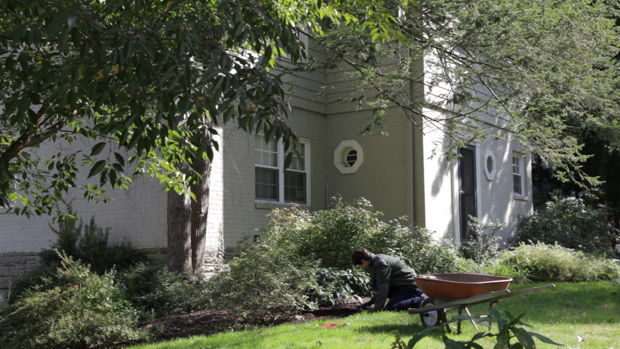
Rest has been in short supply on college campuses since long before I was a college student. It may seem almost unimaginable as a college student to think of having a day free from work. (At least until they invent the eight-day week.) But for many if not most of your classmates, this won’t change on graduation from Swarthmore. Work has become increasingly pervasive in American culture. A frenetic pace of life, including not only our work but also our leisure, has become normal.
Setting apart a day
So in the midst of this culture, I’m here today to talk about why it is even more important for us as Christians to practice the spiritual discipline of Sabbath — setting aside one day a week (generally Sunday) for worship, celebration, and rest. This practice has its roots in the fourth of the Ten Commandments in the Hebrew Scriptures, to set aside the seventh day of the week as holy to the Lord:
Remember the Sabbath Day by keeping it holy. Six days you shall labor and do all your work, but the seventh day is a Sabbath to the Lord your God. On it you shall not do any work, neither you nor your son or daughter, nor your male or female servant, nor your animals nor any foreigner residing in your towns. For in six days the Lord made the heavens and the earth, the sea, and all that is in them but he rested on the seventh day. Therefore the Lord blessed the Sabbath day and made it holy. (Exodus 20:8-11)
The commandment instructs us to remember the Sabbath by keeping it holy, which in Hebrew means “set apart.” What does this mean?
Let’s be clear what the commandment does not say. It does not say “Go to church all day.” It does not say “Pray all day.” Here’s what it does say: don’t work.
Why would not working make the day set apart to God? What is the purpose of not working?
Giving up control and declaring trust
Not working is giving up control and declaring our trust that ultimately God provides for all of our needs, just as we pray in the Lord’s Prayer “Give us this day our daily bread.” It may seem hard to imagine keeping up — much less getting good grades — in college if you have only six days a week to do your work. Keeping the Sabbath for students — and faculty! — is thus a weekly choice to trust God, to lay down our pursuit of success, achievement, and wealth, and instead remember that all of our success and achievement is a gift from him.
In the agrarian society of ancient Israel, especially during harvest time, to set aside one day a week not to work was far riskier and required trusting that God would continue to provide for their livelihood. In fact, just in case they missed the point, in one of the repetitions of the commandments later on, the Lord says to Moses, “Six days you shall labor, but on the seventh day you shall rest, even during the plowing season and harvest you must rest.” (Exodus 34:21) Not getting a paper done on time, or even failing a course, pales in comparison with the possibility of a whole community starving if the harvest isn’t successful.
Let’s be clear that the commandment to observe the Sabbath does not mean that work is bad. On the contrary, the whole of Scripture affirms that working is part of what we as human beings are made for. God gives us the privilege and dignity of participating in and contributing to God’s work rescuing and restoring the whole of the creation.
But we humans have the tendency to worship ourselves rather than God, and one of the ways we do that is to think that we provide all that we need for ourselves. Sabbath is a practice designed to help us outgrow that particular aspect of that sin. That’s why keeping the Sabbath is sometimes called a spiritual discipline.
Lauren Winner, in the introduction to Mudhouse Sabbath, writes: “Practicing spiritual disciplines does not make us Christians. Instead, the practicing teaches us what it means to live as Christians.” (p. xii – xiii)
Living within our limitations
By declaring our trust in God, we also are freed not to try to exceed our created limitations. We are not machines; we are finite human beings with finite abilities who require not only sleep, but also regular rest and refreshment, physically, emotionally, and intellectually. For most of us, most of the time, we are most fully human, andwe do our best work, when we not only have sleep but also regular rest.
This is so important that it must be protected for those with less power than others. The institution of Sabbath as a commandment protects the weak from exploitation by the strong — it is one of the many ways Israel is commanded to practice justice, but doesn’t. The commandment is very specific that Sabbath is to be observed by children, servants, animals, and foreigners as well as the heads of households.
Why on Sunday?
Now, the Sabbath was originally instituted as part of the Jewish law. Christians for two thousand years have added a striking innovation to the keeping of the fourth commandment. Why did the early Christians, most of whom were Jews, begin to observe the Sabbath on the first day of the week (Sunday) instead of the seventh day (Saturday)?
Christians rapidly named Sunday the Lord’s Day, or the “little Easter,” and made it their weekly day given to the Lord because Jesus’s resurrection is at the heart of why we trust God and what we entrust to him.
At Easter, God did for us what we could not do for ourselves. Observing the Christian Sabbath by not working is a chance to affirm our absolute dependence on God every week, and remember his faithfulness as demonstrated through Jesus’s death and resurrection even as we look ahead to Jesus’s return.

What does it look like to actually do this?
So what does it look like to actually do this? If you haven’t observed the Sabbath before (or even if you have), you’re probably thinking, What do I do on Sunday and how do I get my work done?
Surely taking a day off every week is not hard! But we pretty quickly find that to truly spend a day worshiping, celebrating, and resting is actually quite challenging. And I think this is because there is a big difference between simply “taking a break” and observing the Sabbath. That difference is the idea that the Sabbath is holy to the Lord.
On college campuses, and throughout the wider culture of high-achieving America, everyone knows that everyone is working too much, so there is constant rhetoric about “take care of yourself,” “take a break,” “be good to yourself.” “Wellness” is a pervasive theme from student life to columns in major newspapers. But “wellness” is a far thinner concept than what Sabbath strives for.
Keeping the Sabbath is not about being good to ourselves — although it is very good for us! That is because it is not about us at all. It is about affirming the goodness and trustworthiness of God. For this reason to fully practice the Sabbath is part of a lifelong process of learning to trust God. Lauren Winner again: “Practicing spiritual disciplines does not make us Christians. Instead, the practicing teaches us what it means to live as Christians.” (p. xii-xiii)
Before discussing what I do, let me first say what it’s important not to do. For many years, I found it hard not to spend at least part of my Sundays worrying about what I wasn’t getting done. This brought home to me that the most profound spiritual discipline is of the mind. To truly keep the Sabbath, we have to choose not to worry, and intentionally redirect our thoughts when we find ourselves worrying (as we inevitably will).
This is one of the ways that I’m thankful that God has worked in my life. Today, worrying on Sunday is still occasionally a challenge for me. However, now it is much more the case that during the week I look forward eagerly to my Sabbath when I am free not to worry!
An Old Testament Model
With this in mind, let’s look at an Old Testament model of a day set apart to the Lord, from the Book of Nehemiah. This takes place on the return of the Hebrew people to Jerusalem from exile, after generations of living without the Law and hence without following it. The Book of the Law had just been found and the leaders are reading it to the people.
They read from the Book of the Law of God, making it clear and giving the meaning so that the people understood what was being read. Then Nehemiah the governor, Ezra the priest and teacher of the Law, and the Levites who were instructing the people said to them all, “This day is holy to the Lord your God. Do not mourn or weep.” For all the people had been weeping as they listened to the words of the Law.
Nehemiah said, “Go and enjoy choice food and sweet drinks, and send some to those who have nothing prepared. This day is holy to our Lord. Do not grieve, for the joy of the Lord is your strength.” The Levites calmed all the people, saying, “Be still, for this is a holy day. Do not grieve.” Then all the people went away to eat and drink, to send portions of food and to celebrate with great joy, because they now understood the words that had been made known to them.” (Nehemiah 8: 8-12)

What does my Sabbath look like?
What do I do on my Sabbath to worship, rest, and celebrate? I go to church with family and friends; my family gathers around the piano and we sing; in good weather I go for a walk or a bike ride with my family or friends; I listen to podcasts of National Public Radio’s Car Talk; I read; I garden; and my family spends lots of time eating good food together, and we often invite others to join us. I’m not a napper, but my husband likes to take naps.
What guides my choices of what to do? I do things that will help me joyfully affirm the goodness and trustworthiness of God, and I don’t do anything that advances my own success or meets an obligation to someone else. Finally, I make sure not to try to do too many things, so that I don’t need to be watching the clock; I feel it’s important that my time that day reflects God’s abundance and generosity, rather than making me feel that time is scarce.
But how does our work get done?
We must be realistic about what we commit ourselves to. Keeping the Sabbath requires renouncing the pretense that we are omnipotent. We simply must not commit ourselves to doing more than we have time for. Part of Sabbath keeping is not taking on more than we can do.
We tend to think we have no control over how busy we are — that it is imposed on us by our work, or by being smart and wealthy and successful. That is simply not true.
Obviously we will not always do this right. The good news in Christ is that there is grace and forgiveness for us! I have worked on the Sabbath many times in my life. Thankfully, I do it less and less, because God’s Holy Spirit is helping me get better at making good choices, and at recognizing how to deal with missteps effectively.
It’s also essential to be disciplined in our work time. I use my time better when I rest regularly, but I am still tempted, like everyone, to procrastinate regardless of how well rested I am. Again this takes practice, and inevitably we’ll make mistakes. But again, in Christ there are endless chances for repentance and restoration.
Knowing the God we serve
Finally, as we work, we need to remember the nature of our heavenly Father, so that we can remember it on the Sabbath as well. Often being highly successful makes it harder to remember the truth of who our Father is. The shadow side of striving for excellence is often relentless self-criticism, of never being satisfied with ourselves, human limitations and all. It is all too easy to live as though our Father is not ever satisfied either, and to do our work driven by a fear of failure.
But in fact we serve a Lord who has done all that is needed, whose generosity exceeds our wildest imaginations. If we can remember this, and do our work out of joyful gratitude, then on Sundays, we can worship, rest, and celebrate indeed.
See more resources for faculty at the Faculty Ministry page.